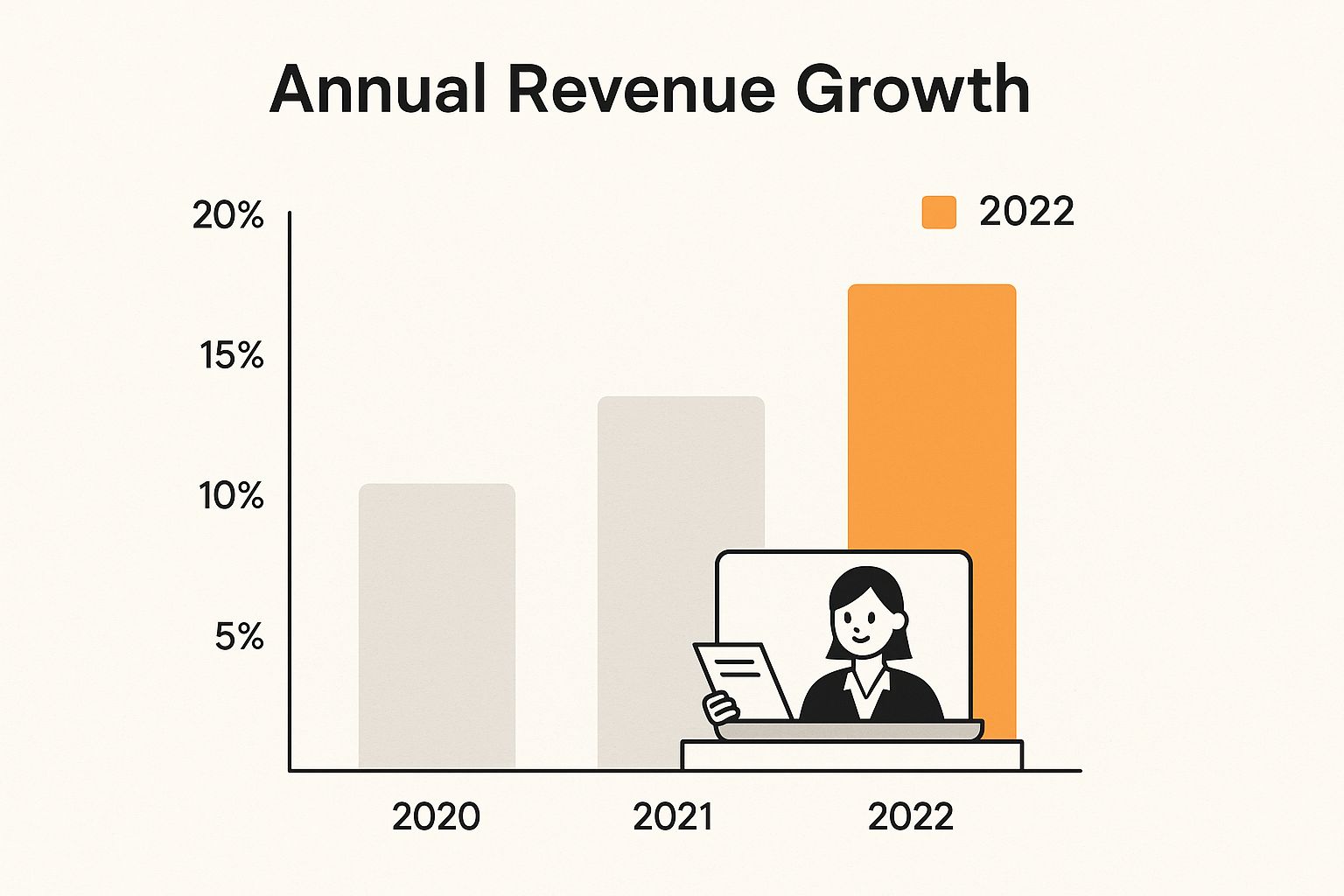
 19 minutes read
19 minutes read
Let's be blunt. Running a law firm feels less like practicing law and more like trying to keep a dozen plates spinning on poles, on a unicycle. A virtual paralegal assistant is the expert help you need—a highly skilled legal professional who works remotely, tackling critical tasks without the soul-crushing overhead of an in-house hire. Think of it less as outsourcing and more as a brilliant, strategic hack for how your firm actually makes money.
Every law firm has financial leaks. They’re usually not from one big disaster but from a thousand tiny cuts—the slow, steady drain from inefficient tasks and operational bottlenecks you’re too busy to fix. You didn't survive law school and the bar just to become an expert in resume filtering and paperwork management.
But that's the reality, isn't it? Every hour you spend on non-billable nonsense is an hour you can't spend prepping for a deposition, advising a key client, or, you know, winning. It's a direct hit to your bottom line.
On the surface, hiring a full-time paralegal seems like the logical next step. Then reality kicks in. The process starts with expensive recruiter fees or hours of your own precious time crafting job posts and swiping left on unqualified applicants. Then comes the endless cycle of interviews, background checks, and salary negotiations. Before your new hire even finds the coffee maker, you're thousands of dollars in the hole.
And that’s just the welcome party. The real financial hangover comes from the ongoing, often-ignored expenses:
This isn’t just about trimming expenses; it’s about reclaiming your most valuable assets: your time and your sanity.

The traditional hiring model is a gamble. You absorb all the financial risk and administrative burden upfront, betting that the one person you hire will be the perfect fit. You're paying for their time in the office, not just their productive output. It's madness.
There’s a much smarter way to operate. A virtual paralegal assistant plugs directly into your workflow, managing essential legal tasks without the financial drag. This isn't just a trend; it's a fundamental upgrade that lets you finally stop the bleeding and get back to being a lawyer.
Let's get one thing straight. When I talk about a virtual paralegal assistant, I’m not picturing some anonymous person in a call center on the other side of the world, reading from a script. That's the old, clunky version of outsourcing, and frankly, it never worked for anyone who values quality.
A true virtual paralegal assistant is a highly skilled, often specialized legal pro. Think of them as a plug-and-play extension of your law firm—someone with the experience to handle critical legal work, but without the overhead of another desk or the drain of office politics. They aren't just an admin; they're a strategic weapon.
This is a professional who can draft a motion, manage discovery documents, and handle client communications just as capably as an in-house hire. The only real difference? They work from their own fully-equipped office, and you only pay for the productive hours you actually need.
It’s easy to confuse a virtual paralegal with a random freelancer you find on a gig site. That’s a rookie mistake. A freelancer is a hired gun for a specific, one-off project. Need a single contract reviewed by Friday? A freelancer is great for that.
But a virtual paralegal assistant is an integrated team member. They learn your firm's workflows, your practice management software, and your client communication style. They’re in it for the long haul, providing the kind of consistent, reliable support that lets you actually scale. It’s the difference between hiring a temp to fix a leaky faucet and installing a whole new plumbing system.

This isn't about finding temporary help. It's about building a flexible, resilient operational core for your firm. You get the stability of an employee without the rigid, suffocating cost structure.
The image below shows just how seamlessly a virtual paralegal can support your practice from anywhere.

It really drives home the point that remote talent can be a direct line to expert legal support, turning your laptop into a full-service extension of your office.
Let's ditch the word "outsourcing." It carries a lot of baggage—think compromised quality and frustrating communication gaps. The modern approach is what I call smart-sourcing. You’re not just sending tasks to the lowest bidder; you're strategically tapping into a global talent pool to find the best person for the job, regardless of their zip code.
This model is picking up serious steam as firms get smarter about running lean. The virtual paralegal assistant market is part of the broader virtual assistant industry, which is absolutely exploding. The market is projected to hit $19.5 billion by 2025 and is on track to surge to $55.4 billion by 2035. Small and medium-sized businesses are leading the charge, making up 44.4% of the market because they need flexible solutions that don't require mortgaging the office ping-pong table. You can explore more on the rapid growth of the virtual assistant industry to see just how big this shift is.
This isn’t a passing fad. It’s a fundamental change in how successful law firms are built. It’s about being agile enough to adapt without tying up all your capital in fixed overhead. You get access to top-tier talent that was previously out of reach, allowing smaller firms to punch well above their weight—without needing a massive budget. It’s the ultimate operational hack.
Let's get tactical. You didn't survive law school and the bar exam to become a professional paper-pusher, yet that's where half your day seems to go. The real magic of a great virtual paralegal isn't just about the bottom line—it's about clawing back the hours you're wasting on tasks that don't require your specific legal genius.
This isn't about blindly handing off work. It’s about strategically offloading the repetitive, soul-crushing tasks that clog up your calendar and keep you from focusing on high-value, billable work. The right virtual paralegal can handle a shocking amount of this workload right from day one.

If your desk looks like a paper recycling plant exploded, you know the feeling. A skilled virtual paralegal can turn that mountain of chaos into a well-oiled machine.
Think of them as your first line of defense against administrative overload.
This is more than just tidying up; it's about building a bulletproof foundation for every case. You stop wasting brainpower on logistics and start focusing purely on legal strategy.
How much of your day is eaten up by phone calls that someone else could handle? Client intake and preliminary research are essential, but they often don't require your direct involvement until much later. Offloading these is one of the fastest ways to see a massive return.
A sharp virtual paralegal can:

The goal is simple: delegate everything that doesn't absolutely require your law license to execute. If someone else can do it 80% as well as you can, hand it off. Your focus should be on the final 20%—the strategic work that wins cases and gets you paid.
Virtual paralegals are reshaping how modern law firms operate. This is especially true for small and medium-sized practices looking to scale without the crippling overhead of in-house staff. For a deeper dive into what you can delegate, check out our guide on the specific https://hireparalegals.com/virtual-paralegal-services/ that deliver the biggest impact. It’s time to stop doing everything yourself and start leading your firm like a CEO.
Alright, let’s talk numbers. Because high-minded concepts don't pay the bills, but a healthier bottom line sure does. When you hire an in-house paralegal, you’re not just paying a salary. You’re taking on a massive, often hidden, financial commitment.
Think about it. That annual salary is just the starting point. Then comes the real fun: payroll taxes, health insurance premiums that climb every quarter, a 401(k) match, and paid time off. You're easily looking at a six-figure total cost before your new hire has drafted their first motion. It’s a financial anchor, and you’re the one dragging it.
A virtual paralegal assistant completely flips that outdated cost structure on its head. You pay for productive work, plain and simple. No benefits packages, no office overhead, no paying for someone's coffee breaks.
Let’s get into the nitty-gritty, because this is where the real savings show up. An in-house employee is a walking bundle of recurring expenses that have nothing to do with their actual work product.
Suddenly, you’re on the hook for:
This old model forces you to pay for presence, not just performance. A virtual paralegal eliminates every single one of these line items. You get the specialized expertise without mortgaging your firm's future.

The old way forces you to gamble. You invest tens of thousands of dollars into a single hire and hope they work out. With a virtual model, you invest directly in the work itself. It’s not even a fair fight.
This isn’t about just trimming 10% off your expenses. This is a fundamental shift in your firm's financial health. The numbers are staggering when you lay them out.
Firms that switch to a virtual paralegal assistant can slash their staffing costs by roughly one-third. This lines up with broader data showing that virtual assistants can cut a business's operational expenses by a whopping 78% compared to a traditional on-site employee. For many firms, this translates to annual employer savings of over $11,000 per hire.
The savings aren't theoretical; they're tangible dollars you can redirect into the business. That's capital you can reinvest into marketing, technology, or maybe—just maybe—taking a decent vacation for once. When you see what a virtual paralegal costs, it becomes a no-brainer. To understand this better, check out our deep dive on typical virtual paralegal rates and how they compare.
This is how smart firms are scaling. They’re not throwing money at bloated overhead; they're making lean, strategic investments in talent that directly drives revenue. Stop paying for empty chairs and start paying for results.
Alright, you’re sold. You see the logic, the savings are clear, and you’re ready to stop the financial bleed. But now comes the tricky part. How do you find a virtual paralegal assistant who will be a genuine asset and not just another headache?
If you don’t have a plan, hope you enjoy spending your afternoons fact-checking resumes and running interviews—because that’s now your full-time job. Don't worry. We’ve been through this process more times than we can count, so you don't have to learn these lessons the hard way.

Your first major decision is whether to go through an agency or dive into the wild west of freelance platforms. I’ve gone down both roads, and it’s a classic trade-off: control versus convenience.
Hiring a contractor directly gives you complete control. You set the exact terms, you hand-pick the person, and you might even save a few bucks on the hourly rate. The catch? You also take on 100% of the risk. You’re now in charge of vetting, background checks, and payment processing. And if they disappear in the middle of a critical project? You're right back at square one. Fun.
Partnering with a reputable agency is a different ballgame. You trade a bit of that direct control for a massive safety net.
For most firms, an agency is the smarter, safer bet. It lets you focus on integrating your new team member, not on becoming a part-time recruiter.
Forget the standard, "What are your greatest weaknesses?" They're useless. You need to get tactical and test for real-world competence.
Here are a few questions I’ve found that actually work:
Never, ever commit to a long-term arrangement without a trial period. This isn't about re-testing their skills—you should have verified those already. This is a test of your working chemistry and their reliability.
Set up a paid trial of two to four weeks with a clearly defined project. Don't just give them busywork. Assign a task with a real deadline and a measurable outcome, like drafting a set of discovery requests. This will show you exactly how they communicate, manage their time, and respond to feedback.
If you want to jumpstart this, finding a quality paralegal for hire from a vetted source is your best first step. It dramatically shortens the search and lets you focus on qualified candidates from day one.
Finding a great virtual paralegal assistant is a solid start, but it’s not the finish line. I’ve seen too many firms hire incredible talent only to drop them into a chaotic workflow with zero guidance. That’s a recipe for frustration, wasted money, and a swift return to the hiring grind.
You wouldn't hire an in-house paralegal and just point them to a desk without a computer or a single instruction. Yet, that's exactly what many lawyers do in a virtual setting. It’s lazy, and it’s a setup for failure.
A smooth integration isn't about micromanagement; it’s about building a predictable system where your new team member can deliver real value from day one. This is the part where you make your own life easier.
Your first week shouldn't be a trial by fire. It’s about setting the foundation for a long-term partnership. Treat your new virtual paralegal assistant like a genuine part of the team, because they are.
Start with the essentials:
This is where most integrations fall apart. Unspoken expectations are a breeding ground for resentment. You think they’re ignoring you; they think they’re being respectful of your time. You need to get crystal clear on communication from the get-go.
Define your communication hierarchy. Is email for standard updates, Slack or Teams for quick questions, and phone calls only for emergencies? Write it down. Be explicit about expected response times. A simple rule like, "Acknowledge all task assignments within two hours," prevents things from falling through the cracks.

This isn't about creating rigid, bureaucratic rules. It’s about building a shared playbook so everyone knows how to win. Clear expectations are the bedrock of trust in a remote relationship.
Finally, establish a concrete workflow for assigning and reviewing tasks. Use your project management tool to assign work with clear instructions and deadlines. Schedule a brief daily or weekly check-in call to review progress and provide feedback. This consistent loop ensures alignment and helps you spot potential issues before they become major problems. This is how you build a high-performing remote team, not just hire a remote worker.
I get it. Shifting from the familiar in-house paralegal to a virtual model can feel like a huge leap of faith. You've got questions, and you need real answers, not just a sales pitch. Let's tackle the things I hear most often from managing partners who are on the fence.
This is the make-or-break question. Let’s be blunt: if a potential virtual paralegal can't give you a rock-solid answer on security, you end the conversation right there.
Established virtual paralegal agencies live and breathe this stuff. They should have ironclad protocols already in place, from mandatory NDAs and secure password managers to thorough background checks.
If you’re hiring a VPA directly, the security buck stops with you. You need to establish the ground rules from day one.
It comes down to this: are you looking for a temporary patch or a long-term partner? A freelancer is perfect for a one-and-done project. Need a single contract drafted by Friday? Great. They do the task, you pay the invoice, and you both move on.
A virtual paralegal assistant, on the other hand, becomes part of the fabric of your firm. They learn your specific workflows, your software, and the unique needs of your key clients. They’re invested in your firm's success because their success is tied to it. One is for plugging a hole; the other is for building a more resilient, efficient firm.
Yes, but this is where your hiring process has to be sharp. During the interview, put them on the spot. Ask them to walk you through the exact steps for filing a specific motion in your local court.
An experienced pro will know the little quirks of your jurisdiction—which clerk prefers things a certain way or the unwritten rules of e-filing. A generalist will give you a generic, by-the-book answer. That's how you immediately spot the difference between someone who can truly support your practice and someone who will just create more work for you.
Ready to stop gambling on risky hires and build a more profitable firm? HireParalegals gives you access to a curated network of over 10,000 pre-vetted legal professionals, ready to integrate into your team in as little as 24 hours. Find your perfect virtual paralegal today.